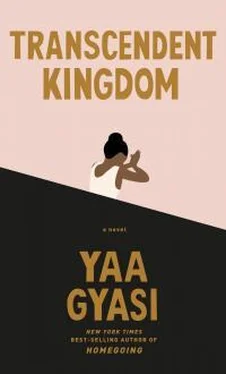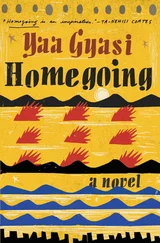When she had me in Alabama, she learned that many Pentecostals here do not believe in baptizing babies. The denomination is characterized by the belief in one’s ability to have a personal relationship with Christ. To choose the Lord, to choose salvation. A baby could not choose to accept Jesus Christ as her Lord and Savior, so while Pastor John would be happy to say a prayer for me, he wouldn’t baptize me until I chose it myself. My mother was disappointed by this. “Americans don’t believe in God the way we do,” she would often say. She meant it as an insult, but still, she liked Pastor John, and she followed his teachings.
When my friend Ashley’s little brother was born, my family was invited to his christening. Ashley stood onstage in a white dress and white shoes with crystal kitten heels. I thought she looked like an angel. Colin cried the entire time, his face red, his mouth sputtering. He didn’t seem to like it very much, but his entire family was radiating happiness. Everyone in the room could feel it, and I wanted it.
“Can I be baptized?” I asked my mother.
“Not until you’re saved,” she said.
I didn’t know what it meant to be saved, not in the context of religion. Back then, when people at church talked about salvation, I took the word literally. I imagined that I needed to be near death in order for salvation to take hold. I needed to have Jesus rescue me from a burning building or pull me back from the edge of a cliff. I thought of saved Christians as a group of people who had almost died; the rest of us were waiting for that near-death experience to come so that God could reveal himself. I suppose I’m still waiting for God to reveal himself. Sometimes, the children’s church pastor would say, “You have to ask Jesus to come into your heart,” and I would say those words, “Jesus, please come into my heart,” and then I would spend the rest of the service wondering how I would ever know if he’d accepted my invitation. I’d press my hand to my chest, listen and feel for its thumping rhythm. Was he there in my heartbeat?
Baptism seemed easier, clearer somehow than almost dying or heart-listening, and after Colin’s baptism I became obsessed with the idea that water was the best path to knowing that God had taken root. At bath time, I would wait for my mother to turn her back and then I would submerge myself in the water. When I lifted myself up, my hair would be wet, despite the shower cap, and my mother would curse under her breath.
Black girl sin number one: getting your hair wet when it wasn’t wash day.
“I don’t have time for this, Gifty,” my mother would say as she brushed out my curls, braided my hair. After my third surreptitious DIY baptism, I got a spanking so bad I couldn’t sit without pain for the rest of that week. That put an end to that.
—
When the wounded mouse finally died, I held his little body. I rubbed the top of his head, and I thought of it as a blessing, a baptism. Whenever I fed the mice or weighed them for the lever-press task, I always thought of Jesus in the upper room, washing his disciples’ feet. This moment of servitude, of being quite literally brought low, always reminded me that I needed these mice just as much as they needed me. More. What would I know about the brain without them? How could I perform my work, find answers to my questions? The collaboration that the mice and I have going in this lab is, if not holy, then at least sacrosanct. I have never, will never, tell anyone that I sometimes think this way, because I’m aware that the Christians in my life would find it blasphemous and the scientists would find it embarrassing, but the more I do this work the more I believe in a kind of holiness in our connection to everything on Earth. Holy is the mouse. Holy is the grain the mouse eats. Holy is the seed. Holy are we.
—
I started playing music around the apartment, songs that I knew my mother liked. I wasn’t really optimistic that music would get her out of bed, but I hoped that it would, at the very least, soothe something inside of her. I played schmaltzy pop-country songs like “I Hope You Dance.” I played boring hymnals sung by tabernacle choirs. I played every song on Daddy Lumba’s roster, imagining that by the end of “Enko Den” she would be up, boogying around the house like she used to when I was a child.
I also started cleaning the apartment more, because I figured she probably liked the familiar scent of bleach, the way it clung to your nose hairs hours after you’d used it. I’d spray the toxic all-purpose cleaner onto the windowsill in the bedroom and watch the mist of it float off and away. Some of those particles probably reached her in the bed.
“Gifty,” she said one day, after I’d wiped the window to gleaming. “Would you get me some water?”
Tears sprung to my eyes as I said, “Yes, of course,” with so much glee you’d have thought she was asking me to accept a Nobel Prize. I brought a glass of water back to her and watched her sit up to drink it. She looked tired, which seemed improbable to me given that she’d done nothing but rest since she got here. I never thought of her as old, but in a little more than a year she would be seventy, and all of those years were beginning to write themselves onto her sunken cheeks, her hands, hardened from labor.
I watched her drink the water slowly, so slowly, and then I took the glass from her after she’d finished. “More?” I asked.
She shook her head and started to sink back down under the covers and my heart sank with her. Once the duvet was completely draped over her, covering her body, nearly to her chin, she looked at me and said, “You need to do something about your hair.”
I stifled my laughter and brought my hands up to my dreadlocks, wrapped them around my fingers. My mother didn’t speak to me for a month the summer I came home with the beginnings of locks. “People will think you were raised in a dirty home,” she argued before falling silent for nearly the entire length of my stay, and now those locks had her speaking again, if only to chastise me. Holy is the black woman’s hair.
19
In college I took a poetry class on Gerard Manley Hopkins to satisfy a humanities requirement. Most of the other science majors I knew took intro to creative writing courses to fulfill the requirement. “It’s an easy A,” one friend said. “You just, like, write down your feelings and shit and then the whole class talks about it. Literally everyone gets an A.” The idea of an entire classroom full of my peers talking about the feelings I’d somehow cobbled into a story terrified me. I decided to take my chances with Hopkins.
My professor, an incredibly tall woman with a lion’s mane of golden curls, walked into the classroom ten minutes late every Tuesday and Thursday. “All right, then, where were we?” she’d say, as if we’d already been talking about the poems without her and she wanted us to catch her up. No one ever responded, and she’d usually glare at us with her piercing green eyes until someone surrendered and stammered out something nonsensical.
“Hopkins is all about a delight in language,” she said one day. “I mean, listen to this: ‘Cuckoo-echoing, bell-swarmed, lark-charmed, rook-racked, river-rounded.’ He’s taking so much pleasure out of the way these words fit together, out of the sound of them, and we, the readers, get equal pleasure reading it.”
She looked ecstatic and pained as she said this, like she was halfway to orgasm. I wasn’t getting equal pleasure from reading it. I wasn’t even getting a quarter of the pleasure my professor seemed to be getting simply from talking about it. I was intimidated by her and I hated the poetry, but I felt a strange sense of kinship with Hopkins every time I read about his personal life, his difficulty reconciling his religion with his desires and thoughts, his repressed sexuality. I enjoyed reading his letters and, inspired to some romantic ideal of the nineteenth century, tried writing letters of my own to my mother. Letters in which I hoped to tell her about my complicated feelings about God. “Dear Ma,” they started, “I’ve been thinking a lot about whether or not believing in God is compatible with believing in science.” Or, “Dear Ma, I haven’t forgotten the joy I felt the day you walked me down to the altar and the whole congregation stretched out their hands, and I really, truly felt the presence of God.” I wrote four such letters, all of which could have been a different petal on the flower of my belief. “I believe in God, I do not believe in God.” Neither of these sentiments felt true to what I actually felt. I threw the letters away, and I gratefully accepted my B– in the course.
Читать дальше












